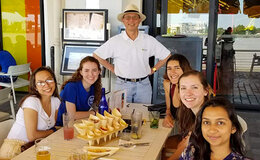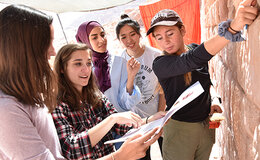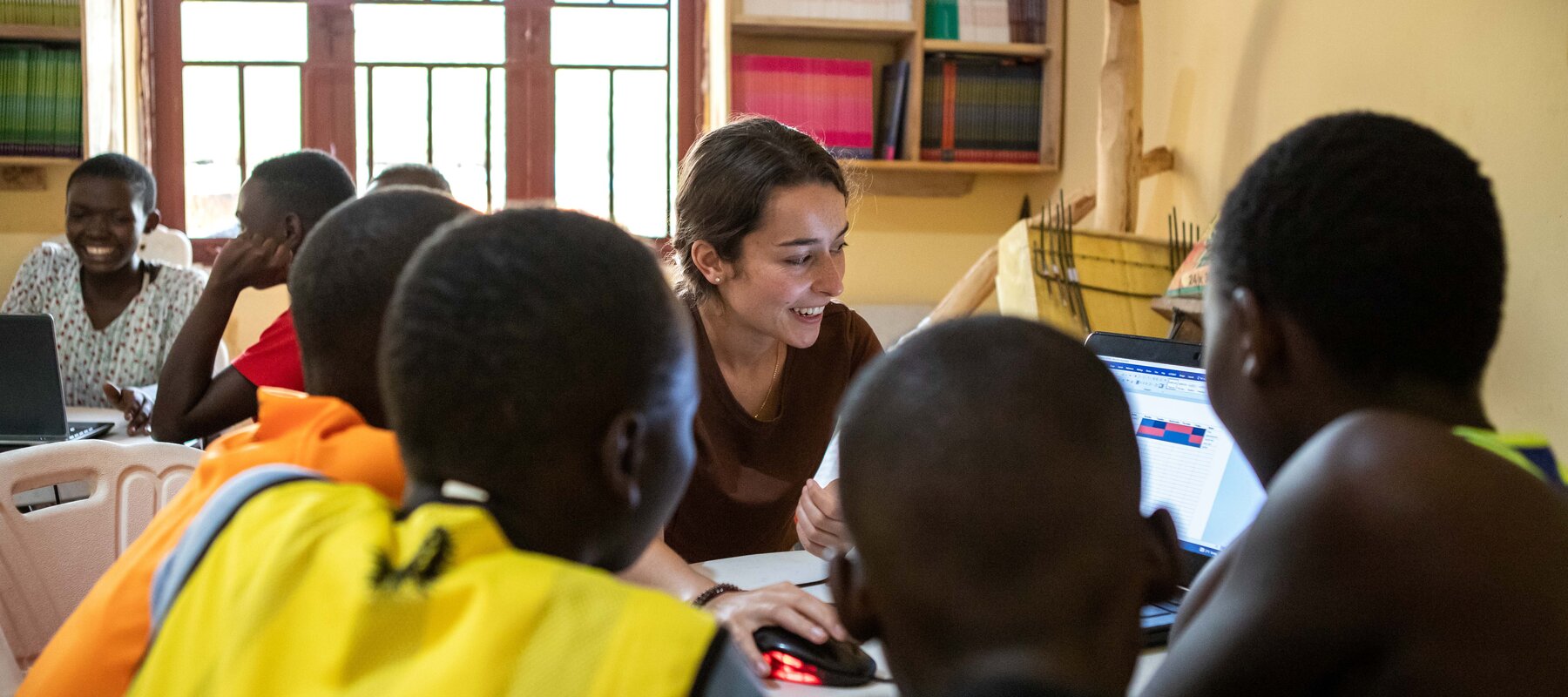The Iacocca International Internship Program (IIIP) offers a unique way for students to gain professional experience and for faculty to further explore their research interests abroad.
The program provides fully funded summer internships for students to work or do research overseas. Opportunities include individual placements provided by Lehigh alumni, partnerships with program providers and group programs led by Lehigh faculty.
Carol Strange, IIIP director, says the faculty-led internships are a way for professors to involve students in their existing research and use their professional networks to help students gain a global perspective. They also help broaden the program’s geographic reach, especially in locations where students are less likely to travel independently.
“Faculty can get student support while also providing interesting and relevant experiences,” she says.
In addition to the preparation work facilitated by IIIP, such as monthly sessions in the spring semester preceding summer internships, Strange says faculty leaders meet with students to discuss the local culture of their country placement and their responsibilities as interns.
Professors vary in their methods of mentoring the groups. Some professors work on the ground in tandem with Iacocca interns, while others connect with foreign research hosts to oversee students’ independent projects.
Global Health Research in Uganda
Kelly Austin, professor of sociology and global studies, studies international development and inequality. She believes that focusing on domestic inequality only scratches the surface of problems faced on a global scale. Her research explores sustainable development, specifically global health research and well-being indicators. Much of her work focuses on sub-Saharan Africa, where she says people are disproportionately impacted by preventable infectious diseases.
Austin was accustomed to researching these topics from “the safety of her computer” in graduate school, using publicly available datasets. However, she found that human perspectives, knowledge of the issues and their pervasiveness in society were only so observable behind a screen.
“In my first year at Lehigh, people were like, ‘You need to get in the field and see how these things truly play out,” Austin says.
She started spending summers in Uganda, sharing her knowledge of diseases such as HIV, tuberculosis and malaria and working with various local organizations devoted to public health. Her initial work with the NGO, Foundation for the International Medical Relief of Children, led her to the Zaale family, which founded the Pathways Development Initiative (PDI) in 2013. Austin has worked with the initiative for almost 10 years, and she now sits on the board of directors.
Shortly after she began traveling to Uganda, Austin started introducing Lehigh students to the organization through IIIP. She says that traveling to Uganda “fundamentally changed me as a person.” She wanted students to benefit from the same experience, especially since many of them are concerned about inequality, sustainability, and climate change and human health issues. (Top photo: Quinnlyn Burger '22 works with children at Pathways Development Initiative in Uganda.)
“We can't solely understand these problems or begin to tackle them if we're not understanding how different people and cultures and worldviews are struggling with these challenges as well,” she explains.
When Austin brings students to Uganda, they live in a homestay at PDI, which Austin likes because it acclimates students to “the best of both worlds”: they get to share the work experience with the Zaale hosts as well as other Lehigh interns. The internship has gotten more popular over the years, Austin says. The first trip saw only four students, while 16 students have joined the trip for summer 2023.
Austin said she would not be the professor she is today without her experiences in Uganda. The opportunity has elevated her own research while she mentors students. She said she has now published about 10 papers with undergraduates, and the diversity of majors involved in a small-group internship also benefits the research.
“I like to include students in research because sometimes they will have a fundamentally different take on things,” she says. “Working in a collaborative setting [on] research can be really enriching and add a lot of value.”
Austin is appreciative of the allotted time for Iacocca internships led by faculty, as she finds the structure of a two-month stay to truly deepen community ties and “build the trust” necessary to positively impact a community.
“The best way for students to learn about complex challenges and international development is to be able to have an experience like this, where they're not just reading about it,” Austin says. “Actually being in a community and building relationships with real people create lasting impacts in a way that taking a course never would.”

Independent Engineering Research in Bordeaux
Daniel Ou-Yang, professor of bioengineering, takes a different approach to his faculty-led internship, which takes place at the University of Bordeaux in France. He travels with the Iacocca interns to Bordeaux and matches them with host professors at the university. Then, after about 10 days, he flies back to the U.S. He says he trusts that students are capable of an independent internship experience.
Ou-Yang mentors from afar, checking in weekly with students about their lab research. He later returns for the final week of the internship period to attend final presentations of the students’ culminated projects.
He recruits students from a diverse range of sciences, including physics, chemistry, material science and mechanical engineering, and brings five students to Bordeaux each year. He says the preparation process ensures that students’ research interests align with the backgrounds of the Bordeaux professors who oversee them in the university labs. He also gives students preparation tasks so they can gain the most from their internship.
“I encourage students to look on the website and publications of their potential future host right to prepare mentally,” Ou-Yang says. “And also [to] see what kind of papers they’ll read.”
Ou-Yang got the idea for the internship in 2016, when he spent two months in France while on sabbatical. He looked for a research lab that would be open to a new collaboration, and one of his former students recommended the University of Bordeaux. He quickly realized it would be beneficial if his students could utilize the labs themselves and get a culturally immersive experience.
Ou-Yang said undergraduate students in France do not typically work in engineering labs, so Iacocca interns from Lehigh tend to impress the Bordeaux faculty with their knowledge.
“They actually find it so amazing, [that] a sophomore and junior can do such good work in the lab,” Ou-Yang said. “It’s not a French system.”
The interns stay in dormitories at the University of Bordeaux, which gives them the independence to explore the region in their free time. Ou-Yang is all for students exiting their comfort zones abroad for the benefit of their professional and personal growth, so he argues for students to take advantage of travel.

A student perspective on research in Jordan
Stephanie Brabender ’21 ’22G traveled to Jordan in summer 2019 with Allison Mickel, associate professor of anthropology and director of the Global Studies Program. The interns stayed in Madaba with Mickel for the first half of the summer and spent the second half in Petra.
Mickel conducts research on the role that local communities have played in archaeological work in the Middle East. In 2020, she received a fellowship from the National Endowment for the Humanities to support a five-year ethnographic research project with the goal of improving foreign archaeologists’ engagement with those communities in Jordan.
Brabender said Mickel has developed personal relationships with the Jordanian people, allowing for interns to visit families’ homes, attend weddings and participate in culturally immersive activities and traditions they would have not done otherwise.
“We were just really in the culture and [Mickel’s] ability to translate really helped,” Brabender says. “She was able to find places that I don't think someone just stopping by in Jordan would have found. So it was very intimate. I don't think a large program would have been able to find those moments.”
The interns also got professional experience by working with Sela, an internet company with which Mickel partnered at the time. Brabender says that in a smaller group setting, interns benefit from professors’ broader availability to guide their experiential learning.
“We got individual attention and [Mickel] provided us with a lot of feedback,” she says. “We never felt like we were doing something just to do it. Like there was always a reason why we were doing something.”
Brabender fondly remembers her birthday in Jordan, which Mickel “made very special.” The group went to the Dead Sea and Petra on Brabender’s birthday with a “special sweet treat” to celebrate.
“Because she had gotten to know me so well by then, she really helped make that day special,” Brabender says. “I still can't get over how cool it was.”
